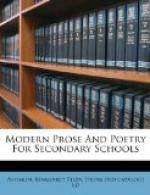The twilight had faded into a velvet blue, sprinkled with stars. The lantern which madame had hung against the arbor shed a yellow light, throwing into clear relief the sharply cut features of monsieur. Up and down the silent stream drifted here and there a phantom boat, the gleam of its light following like a firefly. From some came no sound but the muffled plash of the oars. From others floated stray bits of song and laughter. Far up the stream I heard the distant whistle of the down train.
“It is mine, monsieur. Will you cross with me, and bring back the boat?”
Monsieur unhooked the lantern, and I followed through the garden and down the terrace steps.
At the water’s edge was a bench holding two figures.
Monsieur turned his lantern, and the light fell upon
the face of young
Francois.
When the bow grated on the opposite bank I shook his hand, and said, in parting, pointing to the lovers,—
“The same old story, Monsieur?”
“Yes; and always new. You must come to the church.”
NOTES
=Harlem River=:—Note that this river is in New York City, not in France as one might suppose from the name of the selection.
=Devonshire=:—A very attractive county of southwestern England.
=filet=:—A thick slice of meat or fish.
=charmant=:—The French word for charming.
=Roquefort=:—A kind of cheese.
=Sacre! Vous etes le diable=:—Curses! You are the very deuce.
=passe-partouts=:—Engraved ornamental borders for pictures.
=gendarme=:—A policeman of France.
=Napoleon III=:—Emperor of the French, 1852-1870. He was elected president of the Republic in 1848; he seized full power in 1851; in 1852, he was proclaimed emperor. He was a nephew of the great Napoleon.
=confrere=:—A close associate.
=Garibaldi=:—Giuseppe Garibaldi, an Italian patriot (1807-1882).
=Chianti=:—A kind of Italian wine.
=Bronx=:—A small river in the northern part of New York City.
=Restaurant Francais=:—French restaurant.
=the painter=:—A rope at the bow of a boat.
=C’est merveilleux=:—It’s wonderful.
=Mon Dieu=:—Good heavens!
=pate de fois gras=:—A delicacy made of fat goose livers.
=Chateau Lamonte, ’62=:—A kind of wine; the date refers to the year in which it was bottled.
=Oui, mon pere=:—Yes, father.
=mon ami=:—My friend.
=the little affair of December 2=:—On December 2, 1851, Louis Napoleon overawed the French legislature and assumed absolute power. Just a year later he had himself proclaimed Emperor.
=Louis=:—Napoleon III.
=Victor Hugo=:—French poet and novelist (1802-1885).
=Louis Blanc=:—French author and politician (1812-1882).




